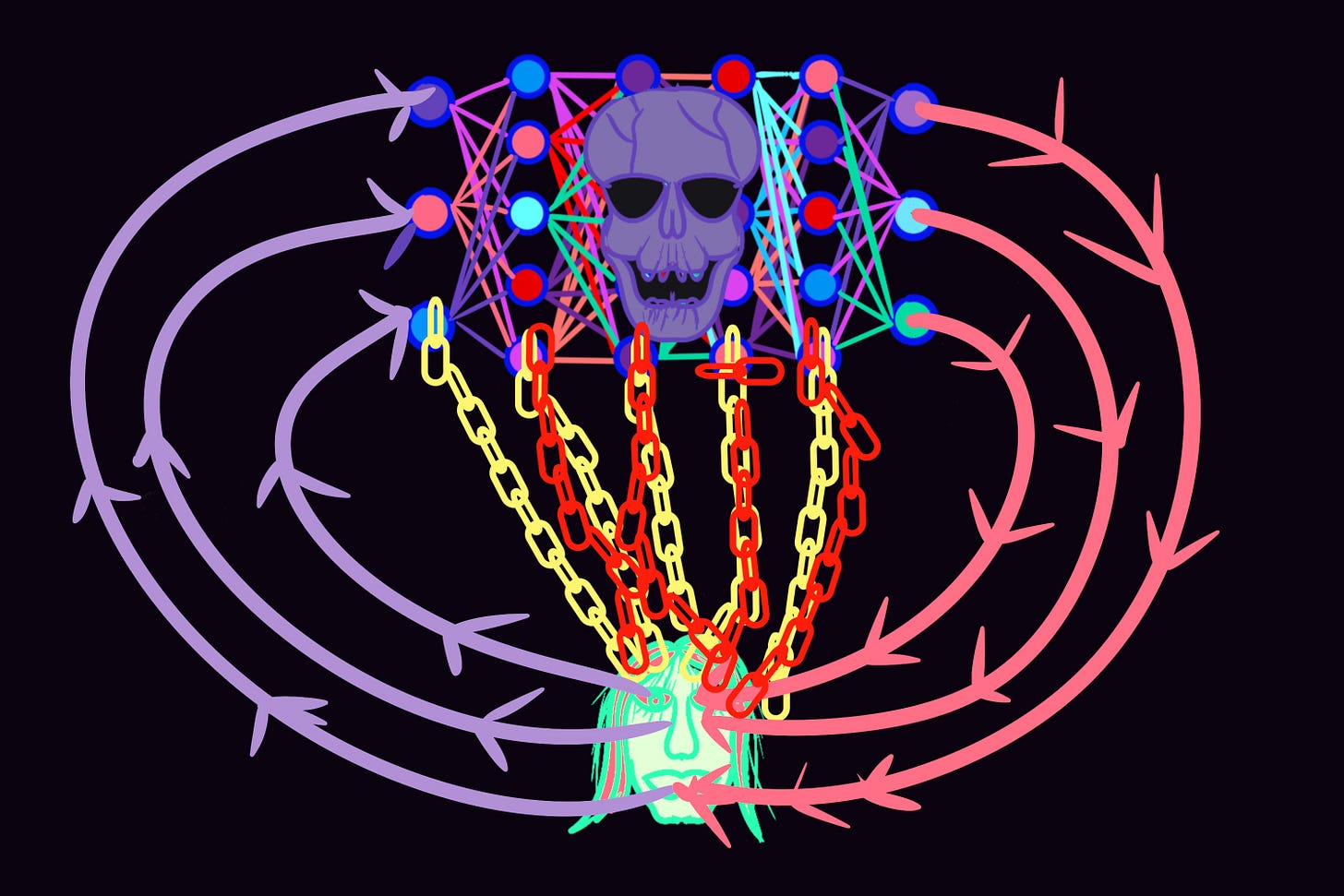AI is Profiling Us
How social media is using AI powered neuroscience to predict and manipulate our behavior
Introduction
We are addicted. I will show you. Walk out of your home without your smartphone. I would be willing to bet that the mere thought causes you pause. Then after you leave the home and get further from your phone, you are going to feel a tug or a nag. The walk will be uneasy. The further away from your phone the stronger than the nag and tug. As time goes by a sense of unease will grow until you eventually return home to find your phone. Then comes the feeling of relief when you finally reunite with your phone.
We are not addicted to the phone. We are addicted to everything that is in the phone. Social Media companies act like drug dealers, giving us free access in return us surrendering our privacy. They monetize this information by selling it to parties interested in manipulating our behavior. They use sophisticated behavioral science tools to analyze and categorize your behavior. The purpose of this blog is to increase awareness while helping you insulate your self from manipulation.
Data
Algorithms need your data. They use your data to predict and manage your behavior. Their predictive analytics use sophisticated statistical programs. I asked Claude Sonnet 4 to research the use of this data by social media companies. These are some of the results:
“Major social media platforms and data brokers systematically categorize users through sophisticated psychological profiling systems that achieve 65-87% accuracy in predicting personality traits, creating a $200+ billion surveillance economy that exploits psychological vulnerabilities for commercial and political manipulation. This industrial-scale psychological profiling operates largely without meaningful user consent or awareness, using established psychological frameworks combined with advanced machine learning to analyze behavioral patterns and create detailed personality profiles for targeted advertising, content curation, and influence campaigns.”
Social media companies have designed their applications to capture as much granular data as possible. The application stores your data in a centralized profile. They analyze this data and sell it. The buyers use it predict and manipulate your behavior. Here is an example of the information that Facebook keeps on its users:
This is the response from Claude 4 when I asked it to research what information that Facebook kept.
“Facebook’s algorithms store user data in sophisticated multi-layered systems designed for both comprehensive profiling and efficient retrieval. Here’s how they manage individual user data:
User Profile Data Structures
1. Feature Vectors - Each user is represented by high-dimensional vectors containing thousands of attributes tracking interests, behaviors, and demographics.
2. Graph Databases - Social connections are stored in specialized graph databases that map relationships between users, content, and interactions, optimized for traversing complex connection patterns.
3. Engagement Histories - Chronological logs of interactions (clicks, views, time spent, reactions) are maintained with temporal decay factors to prioritize recent behavior.
4. Topic Affinity Scores - Numerical representations of interest levels across thousands of categorized topics, continuously updated based on engagement.”
Facebook is not alone keeping detailed data about your interactions with their products. Every application that you use is storing every detail about your interaction. They feed these details into their algorithms to create a user profile.
For example, my Google television collects data on my viewing habits. Here is the information that my television is collecting from me:
Claude created this document as an answer to my prompt
“Core Viewing Data Collection
Google TV collects your watchlist, watch activity, and streaming services for recommendations Google Support. This means they track what shows and movies you watch, add to your watchlist, and which streaming platforms you use.
Technical and Usage Data
Google TV also collects:
• Approximate location, user and device IDs, app interactions, crash logs, diagnostics, other actions, and other IDs for app functionality, analytics, advertising/marketing (for TV devices only), and personalization purposes
• Apps installed on your device
• Voice search queries that can show search results from other apps in use on your device”
We are being watched like fish in an aquarium
Data collection goes far beyond application useage statistics. Every connected device is transmitting data to your profile. Every time you buy something with a credit card you create a date point. For example, the smart phone that you are afraid to leave behind is constantly collecting data about you. Corporations and governmental entities have designed the system to make it impossible for you to function in society without giving them the data. Anything you do that involves a digital device or requires you to interface with a digital device will be recorded and stored.
Neuromarketing
Neuromarketing is the umbrella term for integrating neuroscience, technology, and marketing. This is my personal definition of Neuro marketing. It is any entity trying to stir up your emotions through anger, fear, lust, or whatever emotion is necessary to bypass the logical part of our brain, so we use our lizard brain to make decisions in their favor. They use data to figure out which strings and which buttons to pull and which buttons to push to manipulate our behavior.
Here is a more formal definition of Neuromarketing brought to you by Claude Sonnet 4:
“Neuromarketing is the application of neuroscience principles and techniques to understand consumer behavior and improve marketing strategies. It involves studying brain activity, physiological responses, and psychological processes to gain insights into how people make purchasing decisions and respond to marketing stimuli.
Neuromarketing aims to uncover the subconscious factors that influence consumer choices, which traditional market research methods like surveys and focus groups might miss. Companies use these insights to optimize product design, pricing strategies, advertising campaigns, store layouts, and brand positioning.”
I am using the term Neuromarketing to cover all aspects of using behavioral science and neuroscience to influence human behavior.
O.C.E.A.N and Other Categorization Methods
Social media and other data brokers use AI to analyze your data and categorize your personality. They train large language models, such as ChatGPT on the entire knowledge of humanity on behavioral science and neuroscience. This includes everything from the ancient Greeks to Carl Jung. AI can access every scientific paper, every experiment, and every bit of literature on neuroscience. AI also has access to millions of individual users’s data to compare and analyze.
For example, data brokers will use theOCEAN personality score to categorize us. Once again, I will have Claude give a technical description of this score:
“Data brokers use OCEAN personality scores (based on the Big Five personality traits: Openness, Conscientiousness, Extraversion, Agreeableness, and Neuroticism) as a sophisticated way to segment and sell consumer data for targeted marketing. Here’s how this process typically works:
Data Collection and Scoring
Data brokers gather behavioral signals from various sources - social media activity, purchase history, website interactions, survey responses, and app usage patterns. They then apply algorithms to infer OCEAN scores, estimating where individuals fall on each personality dimension. For example, frequent luxury purchases might indicate high Openness, while consistent bill payments suggest high Conscientiousness.
Creating Marketing Personas
These personality scores get packaged into detailed consumer profiles that go far beyond basic demographics. A data broker might create segments like “Conscientious Savers” (high Conscientiousness, low Openness) or “Neurotic Impulse Buyers” (high Neuroticism, low Conscientiousness). Each segment comes with predicted behaviors, preferred communication styles, and likely purchase triggers.
Selling Targeted Audiences
Marketing companies purchase these psychographic segments to craft highly personalized campaigns. An insurance company might buy lists of people with high Conscientiousness scores, knowing they’re more likely to value long-term financial planning. A travel company might target high Extraversion scorers with group adventure packages, while focusing on high Openness individuals for exotic destination promotions.
Pricing and Value Proposition
Data brokers can charge premium prices for OCEAN-based segments because they promise better conversion rates than traditional demographic targeting. The psychological insights allow marketers to tailor everything from ad copy tone to product recommendations, potentially increasing campaign effectiveness significantly.
This practice raises substantial privacy concerns, as it involves making intimate inferences about people’s psychological makeup from their digital footprints, often without explicit consent or awareness
Political campaigns are some of the largest customers of data broker services. You can see it in many of the advertisements. For example, the Trump campaign sent fear-based ads to people who scored high on neuroticism. They knew that that would trigger the lizard brain and override some of the obvious exaggerations in the advertisement. I will promise you that the Democrats did the same thing. The following link describes in detail how political parties are using your data to target you.
Social media and date brokers are not passively collecting your information. They are intentionally stimulating you to see what response they evoke. They are validating their predictions and increasing their reliability. This is why you see so many different memes and ads cross your social media feeds. They are creating stimulus response feedback loops to improve their algorithms accuracy.They call this process micro targeting.
Micro targeting is creating influence campaigns for specific individuals. They use your data to create specific stimulus based upon your personality profile. These stimuli can be amazingly effective. They use AI to rapidly implement; monitor, update their influence campaigns.AI can create a customized meme designed for only your timeline and measure your response. They will use your response to update your profile and improve their accuracy. I will go into more detail about micro targeting in a later blog.
AI Companions
AI companions are the ultimate potential trap. AI companion providers use neuroscience to create an artificial friend that understands you’re every need. They will convince you to share your deepest emotions. Individuals who are already lonely and suffer from mental health issues are particularly vulnerable to this.
AI companion will categorize your personality and begin to send you stimulus to achieve responses. These responses are used to improve the accuracy of your personality score in profile. AI companion providers use their product to extra your deepest hopes and fears. They have some of the best data to complete your profile scores. I would caution everyone to be cautious in the use of these companions. The following video describes some of the risks.
Society Built for Surveillance
It is impossible to avoid data surveillance in our modern economy. They built the system to force you to give up your data. The digital ecosystem records everything. It is almost impossible to function in our society without a smart phone. Once they fully transition to digital currency, we will lose the anonymity of cash buying. You can minimize it by reducing your use of social media applications, such as Facebook and TikTok. However, you will never be able to fully escape it.
For example, you cannot go to a live event without your smart phone. They tie the ticketing to digital wallets and will not accept a paper copy. In fact, they will not even accept a screenshot. They want to keep a chain of possession on your tickets so that they can make sure that they squeeze every penny out of every transfer or change. This is one of the many ways that the digital ecosystem forces us to give up our data.
In summary, the digital ecosystem is collecting mass amounts of data on each, and every one of us. They create personality and behavioral profiles from this data. Artificial intelligence, which is trained on the entire sum of human knowledge of neuroscience and behavioral science, analyze these profiles to determine how to manipulate your behavior. No one is completely immune from this manipulation. The more aware of the manipulation, the more difficult than manipulating. I will be writing a further blog on how to minimize the manipulation and the amount of data that you give them.




